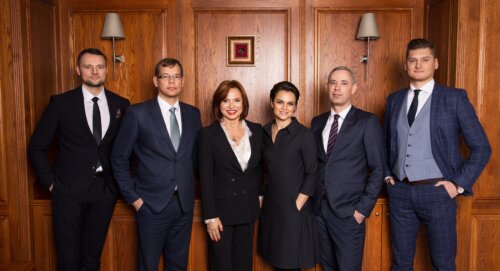Best Child Custody Lawyers in Vilnius
Share your needs with us, get contacted by law firms.
Free. Takes 2 min.
Free Guide to Hiring a Family Lawyer
List of the best lawyers in Vilnius, Republic of Lithuania
About Child Custody Law in Vilnius, Republic of Lithuania
Child custody law in Vilnius, and broadly in the Republic of Lithuania, is designed to protect the best interests of the child. The legal framework aims to ensure children have a stable and nurturing environment when parents are separated or divorced. Custody arrangements are determined by the court and can entail physical custody (where the child lives) and legal custody (decision-making rights about the child’s welfare). The Lithuanian legal system encourages joint custody, believing that children benefit from the involvement of both parents in their lives. However, the court's primary consideration will always be the child's welfare and needs.
Why You May Need a Lawyer
There are several situations where individuals might require legal help with child custody in Vilnius. These include contested custody cases where parents cannot agree on arrangements, situations involving international custody disputes, and cases where there are concerns about the child’s safety or wellbeing. Legal advice may also be necessary for understanding complex legal terms and procedures, negotiating agreements, or representing a parent's interests in court. A lawyer can offer valuable assistance in gathering the evidence required to support a parent's case and in navigating the often emotional negotiations that accompany custody discussions.
Local Laws Overview
In Vilnius, child custody laws are governed by the Civil Code of the Republic of Lithuania. The law emphasizes the principle of the best interests of the child, which is paramount when making custody decisions. The court has the authority to decide on custody issues which may include determining which parent will be the principal caregiver or arranging equal custody sharing. The law also covers child support responsibilities, visitation rights, and any adjustments to custody arrangements if circumstances change. The legal framework also considers the opinions of children aged 10 and above in custody decisions, unless it is deemed inappropriate for the child’s mental or emotional state.
Frequently Asked Questions
What factors does the court consider for child custody cases?
The court considers several factors including the child’s age, the emotional ties between the child and each parent, each parent's ability to care for the child, and the child's wishes (especially if they are over 10 years old).
Can custody arrangements be modified?
Yes, custody arrangements can be modified if there is a significant change in circumstances that affects the welfare of the child. This often requires a new court hearing.
What is joint custody?
Joint custody means that both parents share legal responsibility for the child. This can include joint physical custody, where the child spends a substantial amount of time with each parent, or joint legal custody, where both parents share decision-making responsibilities.
Do grandparents have custody rights?
While grandparents can be awarded custody under exceptional circumstances, they do not have automatic custody rights. However, they can apply for visitation rights or custody if it serves the child's best interests.
What happens if a parent wants to move abroad with the child?
A parent wishing to move abroad with their child must obtain consent from the other parent or a court order. The court will consider how the move affects the child's welfare.
How is child support determined in Lithuania?
Child support is calculated based on the needs of the child and the financial circumstances of both parents. The court examines the parents' income, expenses, and the child's requirements.
Is mediation required in child custody cases?
Mediation is encouraged but not mandatory. It is often recommended as a first step to resolve disputes amicably and can be a more cost-effective and quicker solution than court proceedings.
Will my child’s opinion be considered in custody decisions?
If the child is aged 10 or older, their opinion may be taken into account unless the court decides it is not in their best interest due to maturity or emotional factors.
What if there is suspicion of child abuse in custody cases?
If there is suspicion of abuse, it is crucial to report it to the authorities immediately. The court will prioritize the child's safety and may restrict access to the abusive parent while investigating the claims.
Can non-biological parents apply for custody?
Non-biological parents, such as step-parents or guardians, may apply for custody if they can demonstrate a significant relationship with the child and the court determines it is in the child's best interests.
Additional Resources
For individuals seeking more information or help, the following resources in Vilnius may be beneficial:
- The Ministry of Social Security and Labour of the Republic of Lithuania provides guidelines and support services.
- Local family law attorneys in Vilnius can offer personalized legal advice and representation.
- Child protection agencies in Vilnius offer support in cases where the child’s safety is at risk.
Next Steps
If you need legal assistance in child custody, consider contacting a family law attorney in Vilnius who is well-versed in the local legal landscape. Gather all relevant documents, such as birth certificates, evidence of income, and any previous court orders, before your consultation. Preparing a list of questions or concerns can also help ensure that your session is productive. Remember, the ultimate goal of custody law and any legal proceedings is the welfare and best interests of the child involved.
Lawzana helps you find the best lawyers and law firms in Vilnius through a curated and pre-screened list of qualified legal professionals. Our platform offers rankings and detailed profiles of attorneys and law firms, allowing you to compare based on practice areas, including Child Custody, experience, and client feedback.
Each profile includes a description of the firm's areas of practice, client reviews, team members and partners, year of establishment, spoken languages, office locations, contact information, social media presence, and any published articles or resources. Most firms on our platform speak English and are experienced in both local and international legal matters.
Get a quote from top-rated law firms in Vilnius, Republic of Lithuania — quickly, securely, and without unnecessary hassle.
Disclaimer:
The information provided on this page is for general informational purposes only and does not constitute legal advice. While we strive to ensure the accuracy and relevance of the content, legal information may change over time, and interpretations of the law can vary. You should always consult with a qualified legal professional for advice specific to your situation.
We disclaim all liability for actions taken or not taken based on the content of this page. If you believe any information is incorrect or outdated, please contact us, and we will review and update it where appropriate.
















